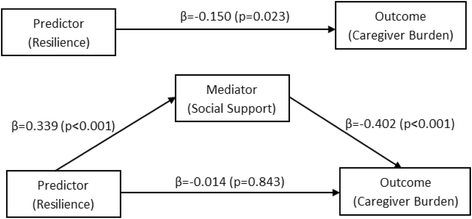Resilience and burden in caregivers of older adults: moderating and mediating effects of perceived social support
- PMID: 29385985
- PMCID: PMC5793423
- DOI: 10.1186/s12888-018-1616-z
Resilience and burden in caregivers of older adults: moderating and mediating effects of perceived social support
Abstract
Background: The burden of caring for an older adult can be a form of stress and influence caregivers' daily lives and health. Previous studies have reported that resilience and social support play an important role in reducing physical and psychological burden in caregivers. Thus, the present study aimed to examine whether perceived social support served as a possible protective factor of burden among caregivers of older adults in Singapore using moderation and mediation effects' models.
Methods: We conducted a cross-sectional study with 285 caregivers providing care to older adults aged 60 years and above who were diagnosed with physical and/or mental illness in Singapore. The Connor-Davidson Resilience Scale (CD-RISC) was used to measure resilience and burden was measured by the Zarit Burden Interview (ZBI). The Multidimensional Scale of Perceived Social Support (MSPSS) was used to measure perceived social support. Hayes' PROCESS macro was used to test moderation and mediation effects of perceived social support in the relationship between resilience and burden after controlling for sociodemographic variables. Indirect effects were tested using bootstrapped confidence intervals (CI).
Results: The mean scores observed were CD-RISC: 70.8/100 (SD = 15.1), MSPSS: 62.2/84 (SD = 12.2), and ZBI: 23.2/88 (SD = 16.0) respectively. While perceived social support served as a full mediator between resilience and caregiver burden (β = - 0.14, 95% CI -0.224 to - 0.072, p < 0.05), it did not show a significant moderating effect.
Conclusions: Perceived social support mediates the association between resilience and caregiver burden among caregivers of older adults in Singapore. It is crucial for healthcare professionals, particularly those who interact and deliver services to assist caregivers, to promote and identify supportive family and friends' network that may help to address caregiver burden.
Keywords: Caregiver burden; Mental health; Older adults; Resilience; Singapore; Social support.
Conflict of interest statement
Ethics approval and consent to participate
The study was approved by the National Healthcare Group Domain Specific Review Board in Singapore and written informed consent was obtained from the participants.
Consent for publication
Not applicable.
Competing interests
The authors declare that they have no competing interests.
Publisher’s Note
Springer Nature remains neutral with regard to jurisdictional claims in published maps and institutional affiliations.
Figures
References
-
- World Health Organization [WHO]. Facts about ageing. 2014. http://www.who.int/ageing/about/facts/en/. Accessed 29 Jan 2018.
-
- Feinberg LF, Pilisuk TL. Survey of fifteen states’ caregiver support programs. San Francisco: Family Caregiver Alliance; 1999.
Publication types
MeSH terms
Grants and funding
LinkOut - more resources
Full Text Sources
Other Literature Sources
Medical



